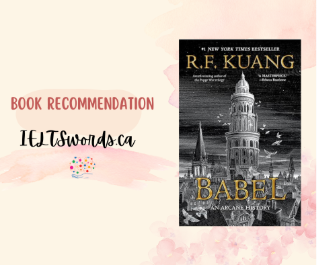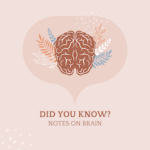BOOK “Babel” by R.F. Kuang

‘But that’s the beauty of learning a new language. It should feel like an enormous undertaking. It ought to intimidate you. It makes you appreciate the complexity of the ones you know already.’
The Dark Academia novel “Babel” by R. F. Kuang has made me contemplate on so many topics and has inspired me to focus on certain controversial questions, such as ..
a…Can language learning be easy?
b…Do actions always speak louder than words?
c…What if there was an Adamic language?
- Can language learning be easy?
When I was five years old, my parents sent me to a pre-school specialized in English learning. On top of daily classes, I had tutoring classes with two other kids twice a week. To say that I didn’t like English at first would be an understatement. I am pretty sure I hated it. I cannot remember much from that time; however, what I do remember is how in elementary school we were drilling pronunciation rules, verb tenses, articles, retelling short stories and learning children verses by heart. I also vividly remember throwing the short story book on the floor holding myself from tearing it apart. Usually these tantrums were followed by phrases like ‘never again…’, ‘don’t even try to make me…’. Anyhow, it did feel like an enormous intimidating undertaking. But, thanks to my parents and my innate stubbornness, I persevered. In high school I started feeling the turn of the tides: it felt so cool to possess and boast such broad lexicon in English, be able to show the first signs of movie comprehension in English and make the first steps in reading unabridged novels in English. Nonetheless, I remember the pulsating pressure of the veins on my way home from my English tutor. The one-and-a-half classes twice a week were so intense and filled with listening – speaking – reading – writing – grammar – vocabulary that I was in intellectual pain. It felt that the skull would burst now and spill all the white and gray matter just because it was so overpowering to hold it in. An interesting fact: most of the work was done in class, and my tutor almost never gave me much homework (maybe a few error correction exercises). Yet again, it felt even more like an enormous intimidating undertaking. Up until this day, I know for sure that it is thanks to my family, my tutor and my daily practices and memory retrieval exercises, that I successfully enrolled into the program of my dreams in Moscow State University with huge competition. My point here is that language learning is difficult, and it cannot and shall not be easy. While acquiring new knowledge, our brain is activating millions of dormant neurons while making them work in synapses. Moreover, our brain is trying to grasp an entirely new way of looking at the world, through entirely different grammar and lexicon. Having said that, there is a way to make it easier though. We should strive to always quiz ourselves on what we know and what we do not know, retrieve the knowledge using various techniques, and just try to love what you are learning.
P.S. At times, I miss being in class engrossed in language learning. Here is a cozy quote from “Babel”:
“The room seemed at once both mundane and heartbreakingly beautiful: the morning light streaming through stained-glass windows, casting colourful patterns on the polished wooden desks; the clean scratch of chalk against the blackboard; and the sweet, woody smell of old books. A dream; this was an impossible dream, this fragile, lovely world in which, for the price of his convictions, he <Robin Swift> had been allowed to remain.”
- Do actions always speak louder than words?
Out of multiple love languages, the language of words of appreciation is my top one. I think that a simple genuine phrase like ‘thank you, you are truly a gem’ can make your day shine brighter. I do and will forever advocate for the idea that words hold true power: they can hurt and tear your heart apart, or can make you smile, laugh, and feel loved and appreciated. I never understood the phrase ‘actions speak louder than words’ as to me in any emotionally intelligent person of integrity actions and words equally show their true values and intentions. I think we should all strive to choose our words wisely and to practice empathy. In the world of future AI-dominance EQ will hold true power in communication.
In the end, words are magic. In “Babel” R.F. Kuang managed to capture that notion through her fantasy world-building and setting. Set in an alternate-reality 1830s England, Britain’s economic supremacy is mainly fueled using magical silver bars, which are made with the help of Babel school translators, etymologists, and linguists. Here is a powerful quote that fully resonates with my thoughts on the topic:
Only Chinese had a
In “Babel”, students study etymology of various languages in order to translate and interpret efficiently. Etymology also is the driving force behind silver bar making that essentially keeps the planet spinning in the book universe. The term “etymology” itself comes from the Greek words “etumon,” meaning “true,” and “logia,” meaning “study” or “science.”
Etymology is the study of the origin and history of words, including how their meanings and forms have changed over time. It involves tracing a word’s development back to its earliest known use and exploring its linguistic roots. Etymology often involves investigating the linguistic elements and historical processes that have influenced a word, such as its derivation from other languages, shifts in meaning, and changes in pronunciation and spelling. Understanding etymology can provide insights into the cultural, historical, and social contexts that have shaped language. Etymology can also help us understand the subtle differences in vocabulary, especially idiomatic expressions and street and course languages. It always fascinates me who etymology can uncover why in English we ‘grow mountain out out of a molehill’, but in Russian we ‘make an elephant out of a mosquito’. Understanding the roots of the expression helps us memorize it better.
- What if there were an Adamic language?
Of course, it’s important to note that the concept of an Adamic language is not based on historical or linguistic evidence but is a theological or mythical idea embedded in religious narratives, particularly within Abrahamic traditions such as Judaism, Christianity, and Islam. The concept of an Adamic language is associated with the belief that Adam was given a unique, divinely inspired language by God. In some traditions, it is believed that this original language was a perfect or divine language, allowing Adam to communicate directly with God and understand the true nature of things. It is often thought that after the Fall (referring to the disobedience of Adam and Eve in the Garden of Eden), the purity and perfection of the Adamic language were lost, and humanity began to speak diverse languages.
If there were just the Adamic language, would communication among nations be eased because of similar cultural and social views, or would humanity still find ways to continue quarreling due to the idea that we all have various values and concepts of well-being?
Here is what Rebecca Kuang says about the concept of Adamic language:
‘For how could there ever be an Adamic language? The thought now made him laugh. There was no innate, perfectly comprehensible language; there was no candidate, not English, not French, that could bully and absorb enough to become one. Language was just difference. A thousand different ways of seeing and of moving through the world. No; a thousand worlds within one. And translation – a necessary endeavour, however futile, to move between them.’
I think in the end, we should practice our empathy to respect and fully absorb that we are all different and unique, and it is our languages, our views, and our actions AND words that make us human and humane.
—– A few quotes from the book —–
On Language Learning:
‘But that’s the beauty of learning a new language. It should feel like an enormous undertaking. It ought to intimidate you. It makes you appreciate the complexity of the ones you know already.’
‘Languages aren’t just made of words. They’re modes of looking at the world. They’re the keys to civilization. And that’s knowledge worth killing for.’
‘We get the word etymology from the Greek étymon. The true sense of a word, from étymos, the “true and actual”. So, we can think of etymology as an exercise in tracing how far a word has strayed from its roots. For they travel marvellous distances, both literally and metaphorically.’
‘Etymology is detective work across centuries, and it’s devilishly hard work, like finding a needle in a haystack.’
‘That’s all speaking is. Listening to the other and trying to see past your own biases to glimpse what they’re trying to say. Showing yourself to the world, and hoping someone else understands.’
On Translation:
‘After all, the Latin translation means “to carry across”. Translation involves a spatial dimension – a literal transportation of texts across conquered territory, word delivered like spices from an alien land. Words mean something quite different when they journey from the palaces of Rome to the tearooms of today’s Britain.’
‘And we have not yet moved past the lexical. If translation were only a matter of finding the right themes, the right general ideas, then theoretically we could eventually make our meaning clear, couldn’t we? But something gets in the way- syntax, grammar, morphology, and orthography, all the things that form the bones of a language. Consider Heinrich Heine poem “Ein Fichtenbaum”. It’s short, and its message is quite easy to grasp. A pine tree, longing for a palm tree, represents a man’s desire for a woman. Yet translating it into English has been devilishly tricky, because English doesn’t have genders like German does. So there’s no way to convey the binary opposition between the masculine ein Fichtenbaum and the feminine eine Palme. You see? So we must proceed from the starting assumption that distortion is inevitable. The question is how to distort with deliberation.’
‘Translation, from time immemorial, has been the facilitator of peace. Translation makes possible communication, which in turn makes possible the kind of diplomacy. trade, and cooperation between foreign peoples that brings wealth and prosperity to all.’
‘The first lesson any good translator internalizes is that there exists no one-to-one correlation between words or even concepts from one language to another. The Swiss philologist Johann Breitinger, who claimed that languages were merely “collections of totally equivalent words and locutions which are interchangeable, and which fully correspond to each other in meaning”, was dreadfully wrong. Language is not like maths.’
‘Do we take words as out unit of translation, or do we subordinate accuracy of individual words to the overall spirit of the text?’
On History & Colonialism:
‘History was malleable.. <…> all that mattered were decisions of the present.’
‘Robin saw a great spider’s web in his mind then. Cotton from India to Britain, opium from India to China, silver becoming tea and porcelain in China, and everything flowing back to Britain. It sounded so abstract – just categories of use, exchange, and value – until it wasn’t; until you realized the web you lived in and the exploitations your lifestyle demanded, until you saw looming above it all the spectre of colonial labour and colonial pain.’
On the Magical Universe:
‘The power of <silver> bar lies in words. More specifically, the stuff of language that words are incapable of expressing – the stuff that gets lost when we move between one language and another. the silver catches what’s lost and manifests it into being.’
‘You’re in the place where magic is made. It’s got all the trappings of a modern university, but at its heart, Babel isn’t so different from the alchemists’ lairs of old. But unlike the alchemists, we’ve actually figured out the key to the transformation of a thing. It’s not in the material substance. It’s in the name.’


